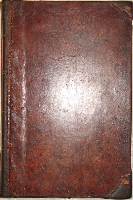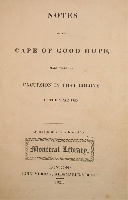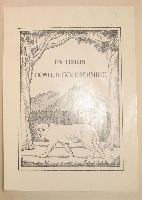Notes on the Cape of Good Hope made during an excursion in that colony in the year 1820.
Year: 1821
Edition: First edition
Publisher: London; John Murray
Category: Africa
Contemporary brown tree calf, rebacked with new leather on spine and corners, flat, gilt ruled spine, divided in five compartments with a gilt title on a red label in the second compartment.
8vo., pp. iv, 207.
Some sporadic light foxing and minor wear to the corners. On one page a remark has been written in old pen, after which it has been crossed out in the same pen. The bookplate of the Africana collector Lionel. B. Goldschmidt on first free endpaper. New endpapers.
Mendelssohn, listing this book under its title as the author then still was unknown, states:
”The anonymous author evidently did not remain long in the Cape, but he gives an interesting account of the state of the country at the time of his visit. He remarks on the opposition of the 'Dutch Boers' to the settlement of the Cape by Europeans, and observes, 'With still greater animosity and alarm do they contemplate the extensive plan of colonisation now about to be carried out by the British Government.' Much is related concerning the habits of the Dutch, whose manners, it is stated, 'are prepossessing to travellers', although in other respects their habits are severely criticised. Some parts of the country are recommended to settlers who possess substantial sums of money with which to commence farming, and the Knysna district, in particular is well spoken of for this purpose...
... By no means a pleasing picture is drawn of the morals of the inhabitants, and the writer was certainly not enthusiastic as to the advantages of the Cape.”
The last part of the book deals with the author’s visit to St. Helena, where he finds it impossible to hear any news about Napoleon, there imprisoned at that time, while he writes about the cost of living on the island: “Living is so enormously expensive that none who have a ship, to resort to, think of remaining on shore.”
At first the book was attributed to Barrow (without substantial evidence), but in 1943 it was Alfred Gordon-Brown who attributed this book to Blount.
Hosken p. 20, Mendelssohn I, p. 290.
Click on a picture to enlarge.




